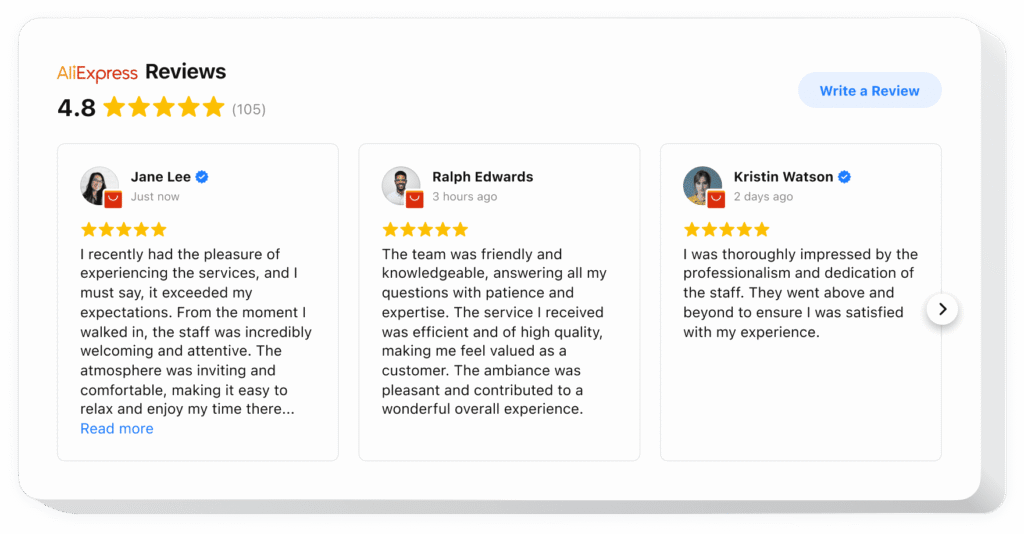

Aliexpress Reviews consumers who want to purchase goods online, whether they are drop shipping or just shopping for themselves, have countless options. Many ecommerce users, especially drop shippers or affiliate marketers, struggle to choose between Alibaba vs AliExpress. Because the names and country of origin of these two businesses are similar, some believe these platforms are the same. However, they actually serve two different functions.
Neither platform is necessarily better than the other, but there are a few major factors that you should consider when you make your decision. Discover how buyers and sellers can compare the two ecommerce platforms to ensure that they get what they need at the best price.
What Is Alibaba?
Most people today know Alibaba as a billion-dollar ecommerce business with hundreds of millions of active users every month. However, the company came from very modest beginnings.
Founded in 1999 by former English teacher Jack Ma and 17 other people, the Alibaba team spent the early years helping small and medium-sized businesses around the world connect with Chinese suppliers and manufacturers. Over the next 15 years, the business-to-business (B2B) platform expanded rapidly.
Over the years, it has steadily become a favorite for both massive conglomerates and drop shippers alike. Items are sold in bulk, helping to streamline orders and cut costs for business owners and drop shippers. However, some sellers are happy to send a few (paid) samples for you to see if the product is right for you before putting in a full order.
In 2014, Alibaba launched what’s now known as one of the world’s largest and most successful initial public offerings of all time. Since then, the company has grown to include the following key features and services:
- Ecommerce
- Digital payment
- Cloud computing
- Digital media
- Supply chain management
- Though its main office is in Hangzhou, China, the company has satellite offices in many countries around the world and operates in more than 200 countries and regions.
What Is AliExpress?
AliExpress is an online ecommerce platform based in China and owned by the Alibaba Group. While both Alibaba and AliExpress are online buying platforms, the major difference lies in the audience each website caters to.
Aliexpress Reviews
AliExpress was built as a business-to-consumer (B2C) platform, so businesses use it to sell their items directly to individual customers with no minimum order quantity. Much like Alibaba, it has an international focus and is available to customers in 220 different countries and regions.
Consumers who use the site enjoy such features and offerings as:
- Secure accounts
- Access to vetted sellers
- Secure payment options
- Order tracking
- Messaging features to communicate with sellers
It’s important to note that businesses can still use AliExpress to sell products at a markup and have the service ship them directly to customers.

Alibaba vs AliExpress Product Quality: What Can You Expect?
Both Alibaba and AliExpress offer a wide range of products made by companies worldwide. However, Alibaba tends to have a better reputation for product quality than AliExpress. While the latter vets sellers to make sure they’re legitimate, it doesn’t review products for quality.
Alibaba generally takes product quality more seriously. Because the platform caters to businesses that need to meet minimum order quantities, it offers a series of logistical services, one of which is inspection.
You can hire an inspector from one of three vetted services to ensure that your order meets quality standards before it ships out. Because manufacturers know their products will be inspected, it reduces the likelihood that they’ll produce low-quality items en masse.
AliExpress also allows third parties to offer inspection services that buyers can take advantage of for a fee. However, these inspectors haven’t been vetted, so the quality of their services can’t be vouched for.
When purchasing from either platform, buyers should consider the following best practices:
- Use verified suppliers on both sites whenever possible
- Read reviews for all products and sellers
- Communicate concerns with sellers and consider their responsiveness
- When buying from Alibaba, place a sample order to check quality
- Take advantage of services offered, such as inspection and trade assurance
While product quality can never be 100% guaranteed on either website, following these basic recommendations will help you stay safe and have the best experience possible.
Alibaba’s standard, ready-to-ship products typically leave the manufacturer’s warehouse in 7–15 days, and when they arrive depends largely on which shipping option you choose. These include:
- Express Shipping: 3–7 business days
- Air Freight: 5–14 business days
- Sea Freight: 20–40 business days
- E-Packet: 7–20 business days
- Rail Freight: 14–30 business days
AliExpress indicates that buyers can receive items in anywhere from 3–60 days. Shipping methods on the ecommerce platform include:
- Regular Shipping (No Tracking): 20–60 days
- Standard Shipping (Certified With Tracking): 10–45 days
- Premium Shipping (Private Courier): 5–10 days
For Alibaba, express shipping is usually the most expensive option. Sea freight is most affordable for heavy items, while e-packet is cheapest for smaller items. For AliExpress, premium shipping carries the highest cost, followed by standard and regular shipping.

